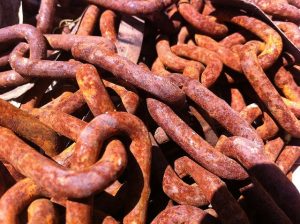
An alloy of iron and carbon, steel is one of the most common materials used in the manufacturing industry. It’s used to make everything from screws and nails to bridges, railroads and more. Like many metals and alloys, though, steel is susceptible to corrosion. Over time, it may develop a layer of corrosion that gradually eats through it. Why does steel corrode exactly?
The Basics of Corrosion
Corrosion is a natural phenomenon that occurs when a refined metal is converted into oxide. It’s essentially the result of a chemical reaction when a metal, such as iron, is exposed to oxygen. Oxygen causes the metal to “oxidize,” resulting in the formation of corrosion.
Steel and Corrosion: What You Should Know
Steel corrodes because it contains iron that, when exposed to oxygen, triggers oxidation. Oxygen is all around us. It’s found in both air and moisture. When steel is exposed to oxygen, corrosion takes place. Some types of steel are better protected against corrosion than others. Regardless, all types of steel can corrode when exposed to oxygen for a prolonged period.
Solutions to Protect Steel From Corrosion
There are solutions available to protect steel from corrosion. When steel is made with chromium, for instance, it’s better protected against corrosion. Stainless steel is a special type of steel that’s comprised of iron, carbon and chromium. Most stainless steel has a chromium content of about 11%. The chromium isn’t evenly distributed throughout the steel. Rather, it’s added as a layer over the iron and carbon. The presence of this chromium layer essentially shields the underlying iron from oxygen in the surrounding environment, thereby protecting it from corrosion.
Another solution to protect steel from corrosion is galvanization. Galvanized steel is distinguished from traditional steel by the use of zinc layer. Like stainless steel, it has a protective layer of over its surface. While stainless steel uses a layer of chromium, though, galvanized steel uses a layer of zinc. Zinc works in a similar way as chromium by protecting the underlying iron from oxygen and, therefore, corrosion.
Steel can be powder coated to protect against corrosion. Powder coating is a finishing process in which powder particles are sprayed over the surface of a metal workpiece. As the powder particles are blasted over the steel, they form a protective shell. Powder-coated steel offers a high level of protection against corrosion because it prevents oxygen from reaching the underlying iron.
